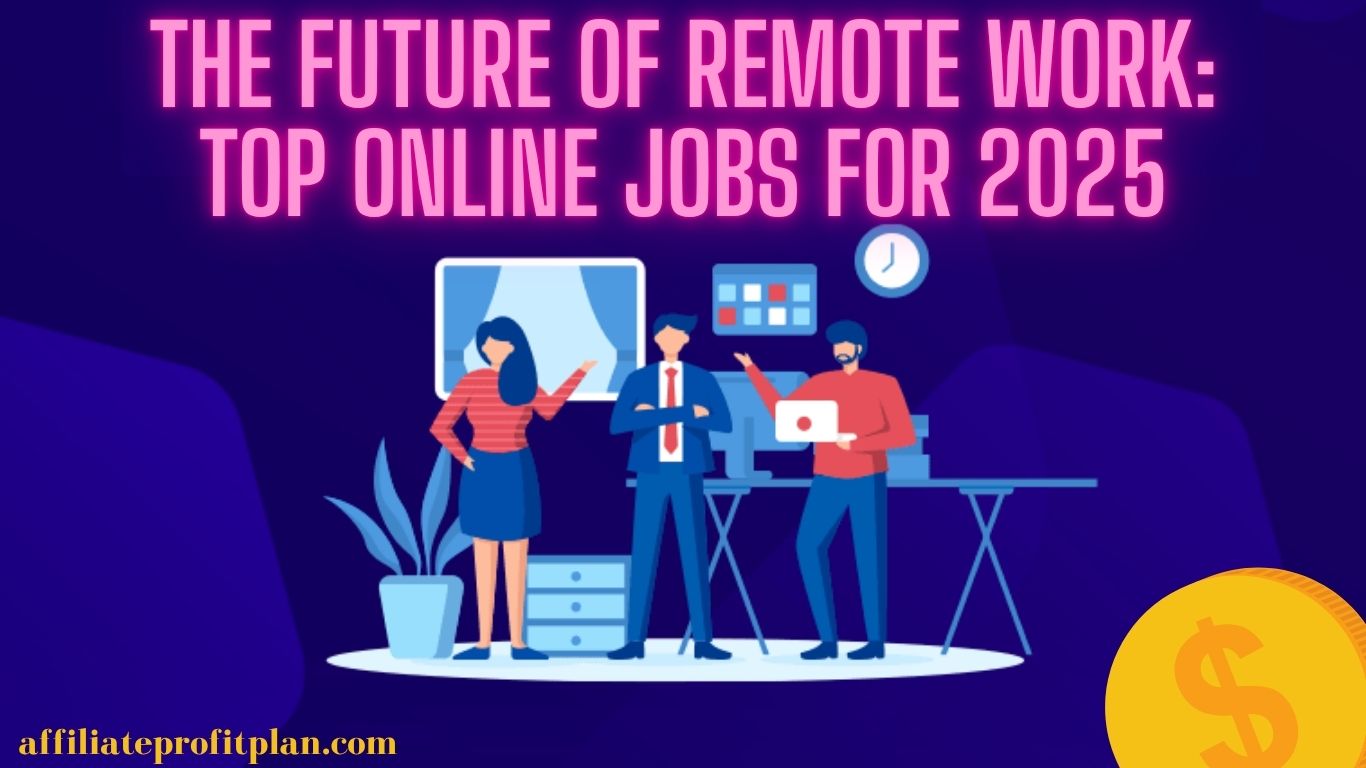Welcome to my article The Future of Remote Work: Top Online Jobs for 2025. Let’s be honest: a few years ago, the idea of working in your pajamas while your cat crashed your Zoom call sounded like a quirky novelty. Fast forward to 2025, and it’s just another Tuesday. Remote work has gone from a crisis-born necessity to a full-blown lifestyle—and it’s only getting bigger, bolder, and frankly, a lot more interesting.
That’s exactly what this article is here to answer. Whether you’re a seasoned digital nomad, a recent grad scoping out your first online gig, or someone who just wants to skip commuting forever, we’ve rounded up the hottest remote jobs poised to thrive in the coming year. So grab your coffee (or your fifth cup—no judgment here), settle into your comfiest chair, and let’s peek into the future of remote work. Spoiler alert: it’s looking bright—and not just because of your ring light.
Access My Proven Blueprint for $50-$100 Daily Income – Watch This FREE Video Now >>>

Introduction
Let’s be real for a second: if someone had told us back in 2019 that our future work life would include juggling Zoom calls from our kitchen tables, investing in fancy ring lights, and considering “business casual” to mean sweatpants with a button-up shirt, we’d have laughed them off faster than a frozen video call. Yet here we are in 2025—and remote work isn’t just surviving. It’s thriving.
In just a few short years, the global workforce has been flipped on its head. Technology has galloped ahead, giving us AI co-workers who never call in sick, virtual reality meeting rooms that look like spaceships, and project management apps that practically send you polite nagging reminders to get your tasks done. Geography matters less than ever, and the world has become a vast hiring pool where your boss might be sipping espresso in Rome while you’re working from a café in Bali. (Jealous? Us too.)
But here’s the thing: while remote work is sticking around, not every job is riding the wave into the future. Some roles are shrinking, morphing, or being taken over by smart algorithms that somehow manage to work 24/7 without needing bathroom breaks. Meanwhile, new careers are popping up faster than you can say “digital nomad visa.” And let’s be honest, we all want to know which jobs will still be paying the bills—and ideally funding the occasional tropical escape—in 2025 and beyond.
So whether you’re an experienced remote worker who’s seen a few too many “You’re on mute” moments, a college grad wondering if you can skip the office entirely, or simply someone who’d rather not deal with rush hour ever again, this guide is for you. We’re diving into the most exciting, in-demand online jobs set to dominate the remote landscape in 2025.
So refill your coffee mug (or your matcha latte, if you’re feeling fancy), cozy up in that ergonomic chair, and let’s take a peek at the future of work. Spoiler alert: it’s looking pretty darn good—and not just because your cat is your new office buddy.
The Evolution of Remote Work: Trends Shaping 2025
Remote work. What started as a temporary fix involving questionable desk setups (looking at you, ironing board standing desks) has now evolved into a full-blown career lifestyle—and in 2025, it’s not just sticking around, it’s graduating with honors.
The days of assuming remote work meant “lazy mornings and mid-afternoon naps” are officially over. Today’s remote employees are more connected, more productive, and—dare we say—more in-demand than ever. But how did we get here, and more importantly, where is it all headed next?
Let’s look at the trends redefining what it means to “go to work” in 2025:
📡 1. The Rise of “Work-From-Anywhere” (Literally)
Thanks to better global internet infrastructure, VPNs on steroids, and a growing list of countries offering digital nomad visas (we see you, Portugal and Indonesia 👋), remote workers can now clock in from nearly any location that sells Wi-Fi and iced coffee.
In 2025, location independence isn’t just for travel bloggers—it’s for data analysts, marketers, even therapists. Just be prepared for your 9 a.m. client call to occasionally feature a rooster in the background.
🤖 2. AI Is Now Your Coworker (And It’s Weirdly Helpful)
The AI revolution didn’t replace remote jobs—it enhanced them. Today’s remote workers have access to virtual assistants that schedule meetings, draft reports, summarize Slack threads, and yes, even remind you (again) to finish that overdue spreadsheet.
If you’re still afraid AI will take your job, here’s the truth: it’s not replacing you—it’s replacing the most annoying 40% of your job. And frankly, we’re okay with that.
🧠 3. Results Over Hours: The Death of the “9 to 5” Mentality
In 2025, companies finally realized that forcing employees to sit in front of their laptops from 9 to 5 doesn’t guarantee productivity—it just guarantees more time spent alt-tabbing between spreadsheets and YouTube.
The shift is now toward output-based performance, meaning as long as the work gets done (and done well), no one cares if you did it at 2 p.m. or 2 a.m. This flexibility has become a top priority for workers—and a smart retention strategy for companies that want to keep them.
🌐 4. Global Talent Pools = More Competition (and Opportunity)
Remote work has unlocked global hiring like never before. Companies in New York are hiring coders in Nairobi. Startups in Berlin are contracting marketers in Manila. That’s great for access, but it also means the job market is more competitive than ever.
The upside? You’re no longer limited to job opportunities in your zip code. The downside? You’ll want to level up your skills, fast—because you’re now competing with the world. (No pressure.)
🪴 5. Employee Wellness Goes Remote, Too
It turns out you can’t just give people a laptop and expect peak performance from their kitchen chairs forever. In 2025, forward-thinking companies are investing in remote wellness: think virtual therapy, burnout check-ins, stipends for ergonomic chairs, and “no meeting” Fridays that are actually respected. (Hallelujah.)
Happy, healthy remote workers stay longer, work better, and burn out less. And companies have finally figured out that’s not just good vibes—it’s good business.
⚙️ 6. Collaboration Is Now Asynchronous (and That’s a Good Thing)
No more chasing five people across four time zones just to schedule a 30-minute meeting. Asynchronous communication—think Loom videos, shared docs, and task boards—has become the norm.
It’s not just efficient; it’s empowering. Employees now have the freedom to focus deeply and work when they’re most productive… even if that means answering emails at midnight with a face mask on.
In a Nutshell…
Remote work has grown up. It’s no longer just a trend or a perk—it’s a cornerstone of how the modern world operates. In 2025, it’s defined by flexibility, powered by technology, and shaped by a global, borderless workforce.
Sure, the future might still include the occasional “Can you hear me now?” Zoom moment—but at least you’ll be muting yourself from somewhere amazing.
Top Online Jobs for 2025 (Main List)
Let’s get to the juicy stuff: which online jobs are set to thrive in 2025—and actually pay the bills (and maybe your next vacation)?
Access My Proven Blueprint for $50-$100 Daily Income – Watch This FREE Video Now >>>
The good news? There’s never been a better time to go remote. The bad news? You’ll have some stiff competition from millions of digital hopefuls worldwide, plus AI bots working overtime.
But don’t sweat it. Here are the hottest online jobs for 2025—the ones that blend high demand, good pay, and enough future-proofing to keep you gainfully employed even when the robots try to steal your lunch.
1. 🤖 AI Content Specialist
If you’ve ever typed “write me a blog post about cats” into ChatGPT, you’ve witnessed the magic—and occasional chaos—of AI writing.
In 2025, companies everywhere need humans who can wrangle AI tools, fine-tune prompts, and edit AI-generated content into something readable, engaging, and legally sound.
Key Skills:
- Prompt engineering (yes, it’s a real job now)
- Editing & SEO know-how
- Creative writing flair
Why It’s Hot:
- AI tools are fast—but still hilariously wrong sometimes
- Brands want quality content, not robotic gibberish
Average Pay (2025 estimate): $45,000 – $80,000/year
2. 🎧 Virtual Customer Experience Manager
Customer service is going remote—and getting fancy. Enter the Virtual Customer Experience Manager, who oversees chatbots, manages remote support teams, and keeps customers smiling from afar.
Key Skills:
- Leadership & people management
- Data analysis to track customer happiness
- Familiarity with AI chat tools
Why It’s Hot:
- Brands want seamless, round-the-clock support
- Remote teams need good management
Average Pay (2025 estimate): $60,000 – $100,000/year
3. 📊 Remote Data Analyst & Visualization Expert
Data is the new oil… but only if someone knows how to refine it. That’s where remote data analysts shine.
These pros sift through spreadsheets, databases, and cloud tools to find trends, create dashboards, and help businesses make smarter decisions (and more money).
Key Skills:
- Data tools like Power BI, Tableau, and AI analytics
- Storytelling with data visuals
- Attention to detail (no one wants decimal-point drama)
Why It’s Hot:
- Businesses can’t operate on guesses
- AI makes more data—but humans still need to interpret it
Average Pay (2025 estimate): $50,000 – $90,000/year
4. 🛒 E-commerce Operations Specialist
E-commerce isn’t just about selling cute mugs anymore—it’s a global juggernaut. Behind every online shop is an Operations Specialist keeping the digital shelves stocked, shipments flowing, and customers happy.
Key Skills:
- Supply chain & inventory management
- CRM and e-commerce platforms (Shopify, WooCommerce, etc.)
- Problem-solving under pressure
Why It’s Hot:
- Global e-commerce sales keep growing
- Even small brands need logistics pros
Average Pay (2025 estimate): $40,000 – $75,000/year
5. 🎥 Online Educator & Course Creator
Got knowledge to share? Good news: people are paying for it. In 2025, the online education market is bigger than ever, driven by individuals hungry for upskilling—and companies investing in employee development.
Whether you’re teaching graphic design, Excel wizardry, or how to bake sourdough, you can turn your expertise into income through online classes, YouTube channels, or paid course platforms.
Key Skills:
- Subject expertise
- Video production & editing
- Marketing your courses
Why It’s Hot:
- Education is increasingly digital
- People trust real humans over faceless corporations
Average Pay (2025 estimate):
- Varies wildly: $30,000 – $200,000+ depending on audience size and niche
6. 📣 Digital Marketing Strategist
From TikTok trends to SEO updates that send marketers into existential spirals, digital marketing remains crucial—and complicated. Companies need strategists who can navigate content marketing, social media, paid ads, and analytics.
Key Skills:
- SEO and content marketing
- Social media mastery
- Data-driven decision making
Why It’s Hot:
- Businesses can’t survive without online visibility
- Algorithms keep changing—humans keep jobs
Average Pay (2025 estimate): $55,000 – $100,000/year
7. 🔐 Cybersecurity Consultant
As the remote workforce grows, so do cyber threats. Enter the Cybersecurity Consultant—the digital superhero who saves businesses from phishing scams, ransomware, and data leaks.
Key Skills:
- Security tools & protocols
- Risk assessment
- Communication (so you can explain threats without scaring people half to death)
Why It’s Hot:
- More remote work = more potential vulnerabilities
- Cybercrime costs businesses billions
Average Pay (2025 estimate): $75,000 – $130,000/year
In a Nutshell…
The remote job market in 2025 is booming—but it’s also evolving. Roles that blend tech-savviness, creativity, and human judgment will thrive in the years ahead.
So whether you’re plotting your escape from the 9-to-5, looking for more flexibility, or simply want a job where pants are optional, there’s plenty of opportunity out there. The future of remote work is bright—just remember to check your Wi-Fi connection first.
Skills & Tools Needed for Future Remote Jobs
Okay, so we’ve established that remote work in 2025 is hotter than a ring light on full blast—but let’s get real for a sec: you can’t just show up in your pajama pants and expect to score one of these jobs.
Sure, working from home means freedom and flexibility. But it also means you’re competing with talented folks across the globe—and occasionally with an AI who never sleeps, never needs coffee breaks, and can churn out a spreadsheet in 0.7 seconds.
So what’s going to keep you in demand in this brave new world of work? Let’s dive into the must-have skills and tools you’ll want in your remote-work toolbox for 2025:
🎯 1. Digital Communication Skills
Think you’re good at writing emails? Great. Now double it. In remote work, communication is your superpower.
- Clear Writing: Whether it’s Slack messages, reports, or client emails, writing clearly (and kindly!) keeps everyone on the same page—and prevents those dreaded “wait, what did you mean?” moments.
- Video Presence: Like it or not, cameras are staying on. Learn to look alive on Zoom, even if you’ve only had two hours of sleep. Bonus points for learning how to un-mute yourself on the first try.
- Cross-Cultural Awareness: Remote teams span continents. A joke that kills in Chicago might bomb in Tokyo. Stay respectful and culturally savvy.
🤖 2. Comfort with AI & Automation
AI is basically your new coworker—and sometimes your slightly over-enthusiastic assistant.
- Prompt Engineering: Knowing how to “talk” to AI tools (like ChatGPT) can save hours of work.
- Workflow Automation: Tools like Zapier, Make, or Notion integrations help you connect apps and save time on repetitive tasks.
- AI Oversight: AI still makes mistakes. Humans are needed to review, edit, and apply judgment. Your brain is still the boss.
📊 3. Data Literacy
No matter your role, data is everywhere. And employers want people who can read, interpret, and tell stories with it.
- Spreadsheet Magic: Excel, Google Sheets, Airtable…if rows and columns scare you, it’s time to face your fears.
- Dashboard Tools: Power BI, Tableau, or even Looker can help you visualize trends that drive decisions.
- Critical Thinking: It’s not enough to show pretty charts—you’ve got to explain what they mean and why they matter.
💡 4. Self-Management & Organization
Here’s the tradeoff with remote work: no boss peering over your shoulder…but also no boss peering over your shoulder.
- Time Management: Apps like Todoist, Asana, or ClickUp help you stay on track.
- Prioritization: Know what matters most each day. Otherwise, your day might vanish into Slack threads and cute cat memes.
- Focus Techniques: Pomodoro timers, noise-canceling headphones, or “Do Not Disturb” mode are your friends.
🌐 5. Tech Savviness
Remote work is powered by digital tools. The more comfortable you are experimenting and troubleshooting, the smoother your workday.
- Collaboration Apps: Think Slack, Teams, Notion, Trello.
- Video Conferencing: Zoom, Google Meet, Microsoft Teams. Bonus: learn how to share your screen without accidentally showing your Spotify playlist.
- Cloud Tools: Google Drive, Dropbox, OneDrive—because emailing yourself attachments is so 2010.
🪄 6. Creativity & Problem-Solving
No matter the role, remote jobs increasingly demand people who can think creatively and fix things when they break.
- Content Creation: Writing, design, video editing—companies crave fresh, engaging content.
- Innovative Thinking: Remote teams often face unique challenges. Your ability to find clever solutions will set you apart.
⚡ 7. Emotional Intelligence
Soft skills are the new hard skills.
- Empathy: Reading tone in text is tricky. Empathy helps avoid misunderstandings.
- Conflict Resolution: Disagreements happen, even remotely. Handle them professionally and without rage-quitting Slack.
- Resilience: Remote work can be isolating. Knowing how to keep your motivation up—and help others do the same—is huge.
🧰 Your Remote Work Toolkit (2025 Edition)
Here’s a quick peek at must-have tools you’ll likely encounter in future remote jobs:
✅ Communication: Slack, Zoom, Google Meet, Loom
✅ Project Management: Asana, Trello, ClickUp, Monday.com
✅ Collaboration & Docs: Notion, Google Workspace, Microsoft 365
✅ Automation: Zapier, Make (formerly Integromat), AI tools like ChatGPT
✅ Design & Content: Canva, Figma, Adobe Suite, Descript
✅ File Sharing: Google Drive, Dropbox, OneDrive
✅ Focus Tools: Forest, Freedom, Pomodoro apps
In a Nutshell…
The future of remote work belongs to the skilled, the adaptable, and the people who can both talk to humans and wrangle technology.
So if you’re dreaming of working from a beach, a mountain cabin, or simply your couch—start sharpening those digital skills now. And remember: the real power tool for any remote worker is a reliable Wi-Fi connection. Without it, you’re just…well, alone with your thoughts.
How to Find Remote Jobs in 2025
So, you’ve decided 2025 is your year to embrace remote work. Visions of leisurely laptop sessions in sun-drenched cafés—or at least never commuting again—are dancing in your head. Excellent choice.
But here’s the thing: the remote job market has exploded. It’s amazing…but also a bit overwhelming. Between thousands of job boards, sneaky scams, and the occasional job ad requiring “10 years’ experience” for an entry-level salary, it’s enough to make you want to crawl back under your blanket fort.
Fear not, brave remote worker! Let’s break down how to actually land a remote job in 2025 without losing your sanity—or your Wi-Fi connection.
🖥️ 1. Go Beyond the Big Job Boards
Sure, sites like Indeed, Monster, and LinkedIn have remote listings. But if you only look there, you’ll be swimming in a sea of generic postings—or worse, jobs that claim to be remote, only to sneak in “must be in-office 3 days/week.” Rude.
Instead, check out niche remote job boards like:
- We Work Remotely – One of the OG remote job boards.
- Remote.co – Curated roles from reputable companies.
- FlexJobs – Subscription-based, but great for vetted postings.
- Working Nomads – Lists jobs by category (tech, marketing, etc.).
- Remotive.io – Tech-leaning, but has other categories too.
- Dynamite Jobs – Startup-focused remote gigs.
These sites often filter out spammy or fake listings and focus exclusively on remote-first employers. That’s a major win.
💡 2. Search for “Remote First” Companies
By 2025, lots of companies have embraced the remote-first model. Translation: they’re built for remote work from the ground up. No awkward half-measures where half the team’s in the office and the other half are Zoom ghosts.
Look for companies that:
✅ Have fully distributed teams
✅ Offer flexible hours
✅ Emphasize asynchronous work (so you’re not chained to someone else’s time zone)
✅ Provide remote-specific perks (like co-working stipends)
Check out lists like:
- AngelList’s “Remote First Companies”
- Remote.com’s company directory
- Built In’s “Best Remote Companies to Work For”
These are often goldmines of potential employers who truly get remote work.
📣 3. Network Like Your Wi-Fi Depends on It
Networking still matters—even when you’re remote. And no, it doesn’t have to mean schmoozing in awkward Zoom mixers where everyone’s talking over each other.
Try this instead:
- Join remote work Slack groups or Discord channels (like Remote Work Slack, Women in Tech, Digital Nomad communities).
- Follow remote-friendly companies and recruiters on LinkedIn.
- Comment thoughtfully on posts from people in your target industry.
- Attend virtual conferences or webinars and follow up with speakers or attendees.
A surprising number of remote jobs are filled through connections and referrals. If people know you’re looking—and that you’re awesome—they’ll often help you out.
🔍 4. Get Creative With Your Search Terms
Here’s a 2025 pro-tip: searching only for the word “remote” might not cut it anymore.
Employers sometimes use alternative phrases like:
- Distributed team
- Work from anywhere
- Virtual position
- Telecommute
- Location independent
- Flexible location
- Remote-friendly
If you’re not finding enough listings, swap in these terms to uncover hidden gems.
🛡️ 5. Beware the Remote Job Scams
Sadly, remote job scams are still alive and well in 2025. Rule of thumb: if it sounds too good to be true, it definitely is.
🚩 Red Flags:
- Companies that hire you without an interview
- Requests for personal financial info up-front
- Job offers that involve “processing payments” or cashing checks
- Vague job descriptions with sky-high salaries
When in doubt, Google the company plus the word “scam” and check sites like Glassdoor or Reddit for warnings.
✨ 6. Make Your Application Remote-Friendly
If you want a remote job, show employers you’re ready for remote life.
Update your resume and profiles to include:
- Tools you’re familiar with (Slack, Asana, Zoom, Notion, etc.)
- Time-zone flexibility (if relevant)
- Self-management skills
- Previous remote or hybrid experience
- Results-focused achievements (employers care more about outcomes than clocking in hours)
Consider creating:
- A short intro video about who you are and why you’d thrive remotely
- A personal website or portfolio showcasing your work
This instantly signals to employers that you’re comfortable working independently—and digitally savvy enough for the remote world.
🏄 7. Stay Persistent (and Flexible)
Let’s be real: remote job hunting isn’t always quick. You might send out dozens of applications before landing interviews. That’s normal.
Keep your skills sharp, continue networking, and stay open to roles you might not have considered. Sometimes the perfect remote career is one you didn’t even know existed a year ago (looking at you, “Prompt Engineer”).
In a Nutshell…
Finding a remote job in 2025 is absolutely possible—but it takes strategy, patience, and a willingness to dive deeper than the usual job boards.
So fire up that laptop, brew yourself a celebratory coffee, and get searching. Your future remote job—and possibly your next beach office—is out there waiting for you.
And remember: always check your Wi-Fi before the interview. Trust me, future-you will thank you.
Conclusion: Remote Work Isn’t Just a Trend — It’s a Lifestyle (and a Power Move)
Let’s be honest—if you made it this far, you’re probably at least remote work curious. And who could blame you? No commute, flexible hours, potential to work in pajamas (or a power suit—your call), and the chance to actually design your work life around your real life? Yes, please.
Access My Proven Blueprint for $50-$100 Daily Income – Watch This FREE Video Now >>>
Remote work in 2025 isn’t just about sipping smoothies on a tropical beach with your laptop (though if that’s your thing, go for it). It’s about freedom, adaptability, and taking control of your career in a digital-first world. From AI-enhanced roles and global job markets to niche gigs and asynchronous schedules, the remote revolution is officially in full swing—and it’s not slowing down.
But here’s the key takeaway: you’ve got to treat remote work like a real job—because it is one. It requires just as much (if not more) discipline, communication, and strategy as an in-office role. Except, instead of someone stealing your lunch from the breakroom, you’ll be fending off mid-morning distractions and the siren song of your couch.
So whether you’re a student looking for your first gig, a cubicle warrior finally ready to break free, or a digital nomad plotting your next escape route—there’s a remote job out there with your name on it.
✨ Polish up your digital skills.
✨ Network like a human (not a bot).
✨ Stay curious, stay flexible, and maybe—just maybe—mute your Slack notifications after 6 PM.
The future of work is here. And it’s wherever you want it to be—Wi-Fi permitting.
Thanks a lot for reading my article on “The Future of Remote Work: Top Online Jobs for 2025″ till the end. Hope you’ve helped. See you with another article.










